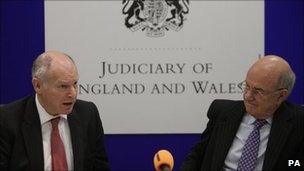Media concession made in injunction report
- Published
Lord Neuberger: "Where secrecy is ordered, it should only be to the extent strictly necessary to achieve the interests of justice"
The media should have the chance to contest applications for injunctions and "super-injunctions" before they are granted, a report by top judges says.
The report, external said super-injunctions were now being granted for "short periods" and only where "secrecy is necessary".
Committee chairman Lord Neuberger also said reports of parliamentary comments which tried to contravene injunctions might be in contempt of court.
It comes as a footballer started proceedings against Twitter.
The player is already involved in legal proceedings against the Sun newspaper and the former Big Brother star Imogen Thomas. He is now taking action against the social networking site for allegedly publishing information covered by a super-injunction.
The player, identified only by the initials CTB, has lodged papers at the High Court.
Lord Neuberger, who is the most senior civil judge in England and Wales, has chaired a year-long inquiry by a committee of judges and lawyers.
Downing Street said the "useful report" would be considered "very carefully".
The committee of judges said:
Super-injunctions and other injunctions "can only be granted when they are strictly necessary"
There was "no doubt" that super-injunctions were once granted "far too often"
Only two super-injunctions had been granted since January 2010
Super-injunctions were now only granted for very short periods where secrecy is essential
Whenever any "anonymised" order was made the court should provide a reasoned judgement for its decision
The report states "the procedure will enable the media to be informed about applications in advance as parliament envisaged".
It says: "We have tried to achieve a procedural system which strikes a fair and proper balance between the principles of open justice and freedom of expression for the public and media and an individual's right to confidentiality and privacy."
However, the report stresses that judges could decide not to alert the media about an impending injunction in exceptional circumstances.
The Lord Chief Justice was also critical of MPs who used parliamentary privilege to "flout" court orders.
The committee recommended that, where possible, journalists should be allowed into courts where applications for privacy injunctions are being made, even though they might not be able to report on them.
Lord Neuberger said the internet "does add to difficulties of enforcement at the moment".
He said the internet had "by no means the same degree of intrusion into privacy as the story being emblazoned on the front pages of newspapers", which "people trust more".
Public relations consultant Max Clifford has been speaking to the BBC about his views on the report and his experience of injunctions
But he warned that modern technology was "totally out of control" and society should consider other ways to bring Twitter and other websites under control.
The report comes at a time of unprecedented public interest and debate about the use of injunctions.
It addresses concerns over gagging orders such as injunctions and super-injunctions - court orders that prevent the media from revealing even the fact that an injunction has been granted.
The report addresses some concerns over secrecy although reporting restrictions would still protect people's anonymity.
But it would allow the press to know what it was they were not allowed to report.
BBC legal correspondent Clive Coleman says the report could not come at a more heated time, with injunctions flouted on Twitter and a campaign against a separate privacy law being conducted by judges.
The issue of privacy injunctions just will not go away, our correspondent says.
Justice Secretary Kenneth Clarke said the report "contains important recommendations which will ensure that injunctions are only granted where strictly necessary".
'Right balance'
"The government is considering the wider issues around privacy and freedom of expression," he said.

The report was introduced by the Lord Chief Justice and the Master of the Rolls
And Prime Minister David Cameron's official spokesman said Lord Neuberger's report was "a very useful report and we will consider it very carefully".
"We think it is important to find the right balance between the rights of privacy and the right to freedom of expression," he said.
Asked about Lord Judge's comments about lawmakers flouting court orders, the spokesman said the report did not appear to make any recommendation to change the law on parliamentary privilege.
Last month, Mr Cameron said Parliament, not judges, should decide on the balance between press freedom and privacy.
On Thursday, Lib Dem peer Lord Stoneham used parliamentary privilege to tell the Lords that ex-Royal Bank of Scotland head Sir Fred Goodwin had obtained an injunction to prevent reporting of a relationship he is alleged to have had with a senior colleague.
'Retrograde step'
Lord Stoneham's intervention caused the anonymity element of his injunction to be lifted at the High Court.
Sir Fred was widely criticised for his role in the near-collapse of the Royal Bank of Scotland (RBS).
The existence of Sir Fred's injunction had already been made public by Lib Dem MP John Hemming, again using parliamentary privilege.
Commenting on the suggestion in the review that reports of parliamentary comments which try to contravene injunctions might be in contempt of court, the Lib Dem MP as an attempt by the judiciary to discourage the media from reporting what happens in Parliament.
"This attempt to gag the media in discussing the proceedings in Parliament is, in my view, a retrograde step," said Mr Hemming.
He added: "What I find disappointing is that there does not seem to be any recognition by the committee that perhaps there is too much secrecy."